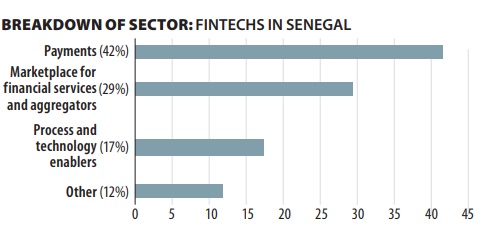
Senegal is one of many countries across the Middle East and Africa trying to diversify its economy and future-proof itself by hosting financial inclusion by employing fintech solutions.
Historically, Senegal’s economy has centred around agriculture, particularly peanuts. However, in recent decades, the government has engaged in efforts to diversify the economy to include other agricultural products, as well as non-agricultural sectors such as tourism and natural resources like oil, gas, and gold.
Capital and financial hub
Dakar
Key Economic Development Strategy
Economic, financial services and fintech overview
By 2025, the government aims to create 35,000 new jobs in the technology sector. Mobile phone usage in Senegal has surpassed 60 per cent this year. Despite this digital advancement, only seven per cent of the population utilises traditional financial services.
As a Francophone nation located in West Africa, Senegal is relatively stable and prosperous compared to some of its neighbouring countries. It is a member of the West African Economic and Monetary Union (WAEMU), and its fiscal and economic policies are influenced by this union, including foreign exchange controls.
However, Senegal remains a developing economy with significant challenges in financial inclusion, particularly in rural areas. The majority of traditional financial services infrastructure, such as ATMs and point-of-sale terminals, are concentrated in the capital city of Dakar, leaving rural areas underserved. Additionally, cash remains the preferred payment method for 56 per cent of Senegalese.
Fintech presents opportunities to address these challenges and promote financial inclusion. Mobile money, in particular, has had a significant impact, with over 70 per cent of adults in Senegal reporting its use within the last 30 days.
Fintech companies like Wave, Senegal’s only fintech unicorn besides Nigeria and Egypt, Bayseddo, a crowdfunding platform for agribusinesses, and Sudpay, offering multiple payment solutions, are leading the way in leveraging technology to improve financial access and services in Senegal.
Key organisations
Central Bank of the West African States (BCEAO)
The common issuing institution of the eight West African member States of BCEAO
Agency for Investment Promotion and Major Projects (APIX)
The country’s investment promotional agency
Senegalese Information Technology Association (SITSA)
The first national association to represent the information industry and professionals in Senegal
Breakdown of Sector:
Image Source: The Fintech Times
Timeline of key fintech highlights
2008 – Banking authorisation regime is regulated by Law 2008-26 of 28 July on banking regulation
2016 – The digital currency ‘eCFA’ was announced by the Central Bank of West African States with Senegal first to see it rolled out – although this initiative was eventually dropped
2019 – Senegal Startup Bill passed (the second country in Africa to have after Tunisia)
Senegal’s fintech timeline continued. Source: The Fintech Times
Key statistics
Image Source: The Fintech Times
This is an excerpt from The Fintech Times: Middle East and Africa (MEA) 2024 Report: read online
The post How is Senegal Leveraging Fintech to Overcome Major Inclusion and Economic Challenges? appeared first on The Fintech Times.
